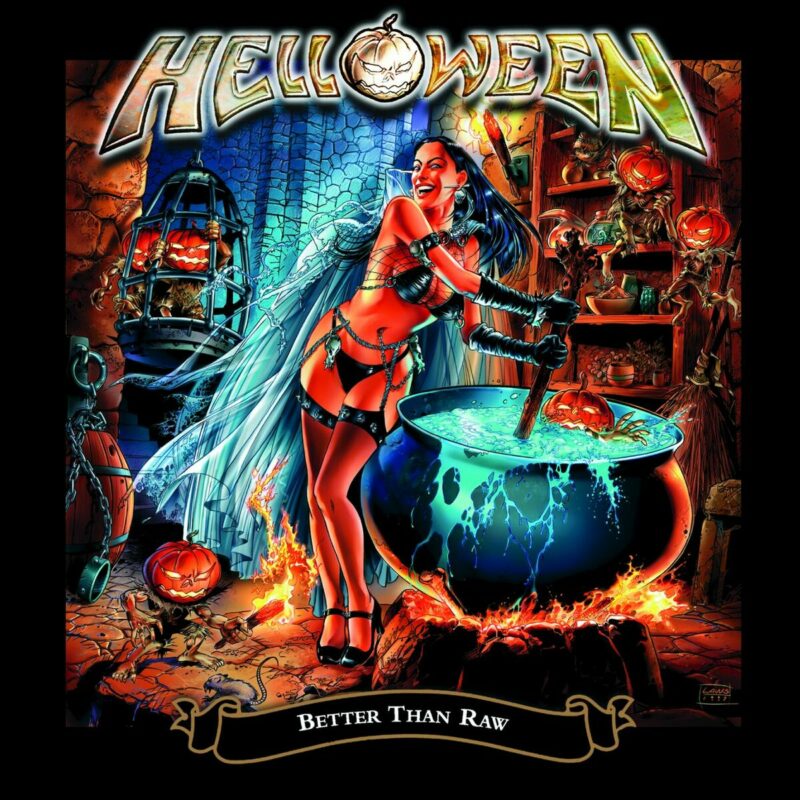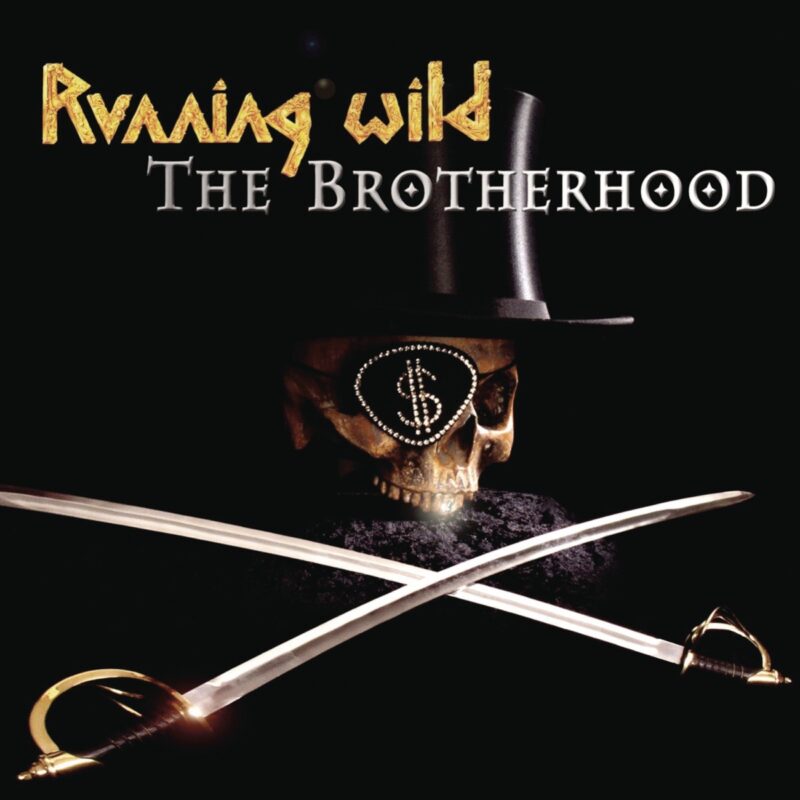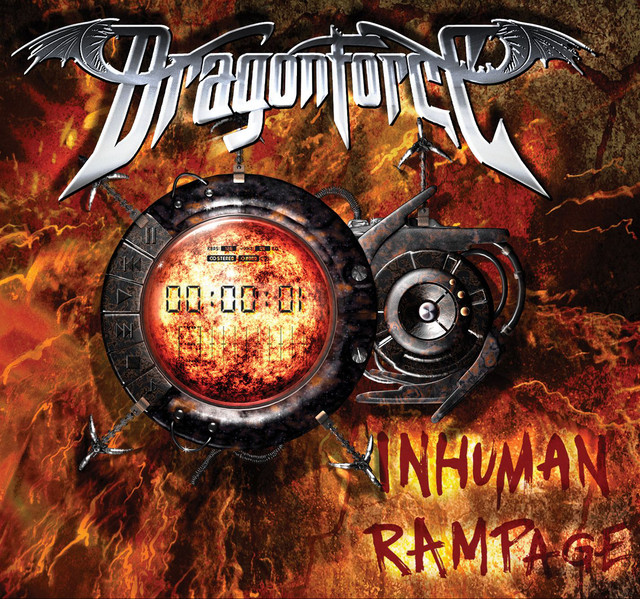
What does the title mean? That, I can’t tell you. It’s an excellent power metal album, however. Time of the Oath was 25% better than Master of the Rings; Better than Raw is 25% greater again. Everything locks into place here. Music, tone, style, production, performance. It’s distinct from anything Helloween made before, yet feels like a summation and endpoint of their 90s style: great songs, performed with panache and energy. Helloween wasn’t just out of “comeback hell” in 1998, they producing melodic power metal that compared decently against their classic 80s run (Walls of Jericho plus Keeper of the Seven Keys I and II).
All of the musicians more than pull their weight, but one of them steals the show. Uli Kusch’s drumming is so damned good here—flashy and technical, yet in-the-pocket and lively. Listen to the way he anchors the start of “Push”—tight triplets on the kicks, with sharp, precise hats punching Markus Grosskopf’s bubbling bass into place like steel tentpegs—or the unyielding chaos of “Midnight Sun”—where flurries of wild snare and tom fills swoop and overtake each other like crazed birds. He adds such interesting skeletons to fairly average midpaced fair like “Hey Lord!” that they seem absolutely compelling.
This might be the most balanced Helloween album from a songwriting perspective. Four songs by Uli, four by Weikath, four by Deris. This is the only 90s Helloween album to have absolutely no songs credited to lead guitarist Roland Grapow, but I happen to know he “ghosted” a fair bit on Uli’s songs. The staccato guitar riff in “Revelation” was written by him, for example.
“Push” is fast. “Falling Higher” is even faster. Tommy Hansen’s production is dated, archaic and rough, with bits of dust seeming to cling to the cracks in every note. I think this was the last time they ever worked with Hansen, and represents another breaking point with their classic power metal style. Subsequent albums had a more modern (sometimes too modern) sound.
There are some recondite progressive rock touches in the album’s second half, which, unlike Chameleon, are well done and don’t seem too distinct from the band’s core style. “Time” and “A Handful of Pain”.
The worst song is probably Weikath’s “Lavdate Dominum”, which listens like a goofy punk rock song, or a heavy metal cover of some Christmas carol. I don’t know what the idea was here. He also gets the album closer, “Midnight Sun”, which is really good; extremely lengthy and technical while also fraught with emotional agitation. One of Deris’s great vocal tracks is on this song.
There are two great songs, that are pretty much in the top 10 greatest Helloween tracks every time I make a list. The first is Uli Kusch’s “Revelation”, an amazing, warp-speed epic that seems to be a jaded postmodern take on the Bible. Astonishing shifts in feel and tempo, solo after solo, weird digressions into funk rock and thrash, the album’s greatest chorus…Worlds form, collide, and break apart inside this song.
The second is a complete surprise. “I Can” is one of the hardest sellouts Helloween ever sold, literally being an alternative rock song that sounds like New Order’s Get Ready more than anything, But it’s extremely well-written, compact, and catchy. I’m glad they didn’t go further into the territory explored here, but man, I’m glad they planted a flag at least this far.
1998-2000 was the era where power metal became incredibly competitive: bands like Gamma Ray and Stratovarius were in the middle of career-defining hot streaks, newcomers like Freedom Call even America was finally becoming relevant again thanks to Virgin Steele and Kamelot. Better than Raw ranks alongside the best of that period.

Running Wild fans disagree on when the band went bad. Some say the classic period ended with 2000’s Victory, when drummer Jörg Michael left and was replaced in the studio by “Angelo Sasso”, a man who has never played live, has never been seen or photographed, and who sounds remarkably like a drum machine. Others draw the line at 2002’s The Brotherhood, when longtime guitarist Thilo Hermann quit and the band became a Rolf Kasparek solo project. Others cite 2005’s Rogues en Vogue, which has music just as good as its title (unfortunately). Still others point to 2000’s Oops I Did It Again as the turning point when the band fell apart, which is strange because that’s a Britney Spears album. I’m still not sure about their whole deal.
Me? In my house, we support Victory. Despite its fake drums and Rolf’s strange notions about songwriting, it’s still a powerful work, hewing to the band’s strengths (those tremolo-picked pentatonic melodies that define the Teutonic sound), and “The Hussar”, “Tsar”, and “Victory” are some of the best songs the band recorded in the 90s. Don’t be fooled by the Beatles cover. Victory is power metal of nearly the first rank.
The Brotherhood is the album people accuse Victory of being: it’s seldom better than tolerable, and is often actually bad: either uninspired or inspired in wrong directions (obnoxious butt rock and ripoffs of KISS and AC/DC). It doesn’t just capture the band in sharp decline, it captures a new, weird version of Running Wild that’s barely a band at all: Rolf wrote all the songs, played all the guitar parts, programmed the drums, self-produced the album, etc, and the big problem with McCartney II-style bedroom records manifests itself, there’s nobody to rein in his worst impulses as a songwriter.
Rolf always had a love of KISS-style arena rock, but he knew on some level that most Running Wild fans do not share that love, so he kept it down to a dull roar. One or two songs like “Kiss of Death” and “Fight the Fires of Hate” exist per album, but no more. But suddenly, the album is packed with goofy shoutalong “stadium” moments, crowding out the speed and melody.
It’s a terrible idea. Even if you like KISS, Rolf is no Paul Stanley vocally, and the drum mach—I mean, Angelo Sasso gives the performance a sterile, enervated tone. Stadium rock is all about involving the audience in a collective human experience bigger than the sum of its parts. You can’t do that when your drums sound Kraftwerk-mechanical. Rolf is attempting to evolve the band’s sound in a direction that neither his skillset nor budget will allow.
After “Welcome to Hell” (the most boring fast song Rolf ever wrote—it goes through you like water), we get “Soulstrippers”, where the album rolls up its sleeves and starts doing what it really wants to do: lame power chords, a tempo set at a midpaced choogle, and a general brainless vibe of “ARE YOU READY TO ROCK?” that clashes with the socially conscious lyrics about media partisanship. But honestly, I’m glad someone finally solved that issue using the most powerful force known to man: boomer rock.
(Update: further research suggests “Soulstrippers” by Running Wild did not actually solve media partisanship. We regret the mistake.)
“Crossfire” is the same song again, even the stop-start pattern to the (very generic) “riff”. “Detonator”…look, this is a family website. I won’t assault your ears with offensive racial slurs like “d*d r*ck”. Let’s just say that if this song was a person, it would be a man, about 40 to 50 years old and recently divorced, with a widening paunch, a receding hairline, a pool room equipped with a wet bar, a collection of bespoke fishing lures, and an ability to flawlessly do a Johnny Carson golf swing on command. That’s how dad this song is. It’s like a bad parody of an AC/DC track. Just horrible to hear.
“Unation” always reads like “Urination” to me, which would make more sense than the real title. What does “Unation” mean? An “un”-nation? A “nation” made of “U”? I don’t want to be part of Rolf’s nation: he’s a pirate, and I don’t think my civic rights will be well-respected. The song itself is not bad: a kind of overlong torch anthem that makes you GET YOUR FISTS IN THE AIR and then hold them up for nearly six minutes straight. Life is tough in the republic of Unation.
“Dr Horror” is yet another dad rock opus with weak riffs and barely any metal influences at all. In the second verse, Rolf shouts “SEX!!!” for seemingly no reason. Also, what does he mean by “Tittytainments overload”? Actually, don’t tell me. Clearly, there were things going on in Helmut Kohl’s Germany that history is better off forgetting.
Closing epic “The Ghost” is based on Lawrence of Arabia. It invites direct forensic comparison to past epics like “Treasure Island”, and you hear that the songwriting just isn’t there anymore. The song is a chore to get through: it shows Rolf busting out the double harmonic major scale for an ersatz-Oriental feel, but even that’s a stale and unengaging cliche. At least it’s metal.
However, there are a few decent tracks.
“Siberian Winter” is an instrumental (a rarity for latter-day Running Wild) that’s quite fast. After “Crossfire” and “Soulstrippers”, hearing double-bass drumming again made me want to cry with relief: I felt how the Wehrmacht on the Eastern Front must have felt when they found a soldier’s fallen-off leg to eat.
“Pirate Song” is the band swinging at the safest target imaginable: an uptempo power metal song about pirates. It’s good, which is no surprise. This is the equivalent of Georgia O’Keefe painting her own labia flaps: the band’s in its artistic safe zone here.
“The Brotherhood” is a long-winded but compelling mini-epic that harkens back to The Rivalry. It’s slow, heavy, methodical, and works perfectly. The title track on Running Wild albums is invariably great, a streak which would dramatically break with 2005’s Rogues en Vogue, where none of the songs are good.
Overall, the album is dregs and distillates. The highlights are just faded Xeroxes of past glories. The lowlights are the worst influences possible. Rolf is clearly losing interest in the Running Wild sound, and although he can go through the motions, The Brotherhood just isn’t that. Like trying to get drunk off a bottle that was emptied days ago.

Liked it when I was a teenager. Still like it now. I was born with correct opinions.
Fast, fast, fast power metal, driven by pummeling double bass and wild guitar-shredding. Thousands of notes blast out, stinging and singing like flocks of golden birds. As a kid, I couldn’t believe what what I was hearing. “There should be a law.” If guitars had human rights, both Sam Totman and Herman Li would be trading harmonica solos on death row.
Later discoveries like Galneryus, Vai, Satriani, Gilbert, Shrapnel Records, Yngwie, Buckethead, and even stuff like Nitro would make the DragonForce blitzkrieg sound more ordinary. But when you’re sixteen, this album does to the ears what Arnold Schwarzenegger does to a rainforest in Predator. Not every bullet kills, but they fire a million of them. When I heard Li snapped a string recording the final solo for “Through the Fire and the Flames” (it’s at 6:57—that BROINNGGG that sounds like a saxophone flutter), my first thought was “you mean there were five strings that didn’t snap?”
It’s an assault of notes, with the metronome stuck at exactly 200 bpm (fifteen years later, I’m still mentally reliving an argument I had with a guy last.fm who insisted they’re 100 bpm, because that’s what iTunes told him. Are your ears painted on, bro?). Singer ZP Theart is the steel truss rod supporting the album amidst the chaotic 16th note tapping and sweeping. Without his lead melodies, the enterprise would collapse.
Inhuman Rampage is a real “guitar” album, but few serious guitar players enjoy them. DragonForce never had a chance at being cool: they rocketed to fame in 2006 after a song of theirs appeared in Guitar Hero 3. Truly, the roads to metal immortality are as many as the stars in the sky. Varg Vikernes killed a dude. Glen Benton razored a swastika into his forehead. DragonForce, the absolute madmen, got a song on Guitar Hero 3.
“Through the Fire and the Flame” was their breakout hit. It’s a very good song, though I imagine they regretted writing the intro, because they have to play the song at every show and thus must take a nylon-stringed classical guitar on the road for the rest of their careers. But then there’s “Revolution Deathsquad”, which is even better. And “Operation Ground and Pound” is better again. There’s no actual compelling factual reason “Fire” escaped containment and became their career-defining song, except by circumstance. It could have been one of about four other songs.
Inhuman Rampage is consistently high-quality, but it’s all the same kind of quality. This is the other problem with DragonForce: they tend to burn out the listener. One of the album’s best tracks, “The Flame of Youth”, bounces off you because you just heard “Cry for Eternity”. But it’s a wonderful song, with a great keyboard solo from Vadim Pruzhanov (an underrated member of the band, along with Dave Mackintosh and his nimble drumming). I recommend mainlining only three DragonForce tracks at a time. There’s a lot of ideas and creativity on display, but it’s all culled from the same part of the songwriting amygdala. If DragonForce all sounds the same to you, it’s because you’ve overlistened to them, and your ears have grown a callous.
The album ends with “Trail of Broken Hearts”, which I don’t think I’ve ever listened to all the way. It’s a Poison/Motley Crue style power ballad that doesn’t really work: it sounds too clean, without that whiskey-and-cigarettes roughness that Axl Rose and so forth sometimes bring to a power ballad. But do get the Japanese edition, or whatever version has “Lost Souls in Endless Time” as a bonus track. That song is just nuclear.
It’s easy to turn a corner with this band. First you love them. Then you regard them as videogame sounding trash. Then you love them and regard them as videogame sounding trash. Corners, man. Keep turning them and you’re back where you started.
But I never hated this album. It feels like the purest distillation of DragonForce, and perhaps of power metal. The moment in the storm when there’s more rain touching your face than air. Terrifying, unendurable, but brilliant in its purity. An experience not to be missed.
There’s an art approach called horror vacui—literally, “fear of empty spaces”—where every square inch of the artwork is filled with super-busy linework, as though there are ghosts that might lurk in blank spaces. There’s another style called Wimmelbilderbuch—literally, “teeming picture book”—where an image seeks to contain an entire book’s worth of content: gaze into it, and you’ll see tiny lives, little threads of story spun out and then snipped off. The most famous Wimmelbilderbucher are Martin Handford’s Where’s Wally puzzles, although Hieronymus Bosch could surely be mooted as an early example of the style.
Where does that leave DragonForce? Between the two. Horror vacui is frantic nonsense, endless jabbering so you don’t hear the quiet, and it has pessimistic undertones. Wimmelbilderbucher are wholesome puzzles or fascinating slices of life. DragonForce makes bright optimistic music, made for teenagers and videogames and teenagers who playe videogames, but their intensity borders on a horrific edge. The shredding soon no longer registers as guitar playing, but rather the endless teeming of a million maggots, coiling and uncoiling in viscera. That sounds like a weird comparison, but I find the sight of masses of maggots deeply fascinating. If you are the sort of person who doesn’t give a fuck about finding Waldo, but just likes staring at those impossibly packed yet dead (or beyond dead—they never had a life) people, then give DragonForce a try.
Yeah, Guitar Hero 3 was a mixed blessing. Yeah, they became a laughingstock at a certain point. I heard “FagonForce” and “DragonFarce” so many times that I started keeping my appreciation of them to myself. The image of a locked vault with a firestorm raging behind it proved prophetic. But this is special, special music to me.
(I just looked at the cover for the first time ever and saw that it’s actually not a locked vault. Oh.)



